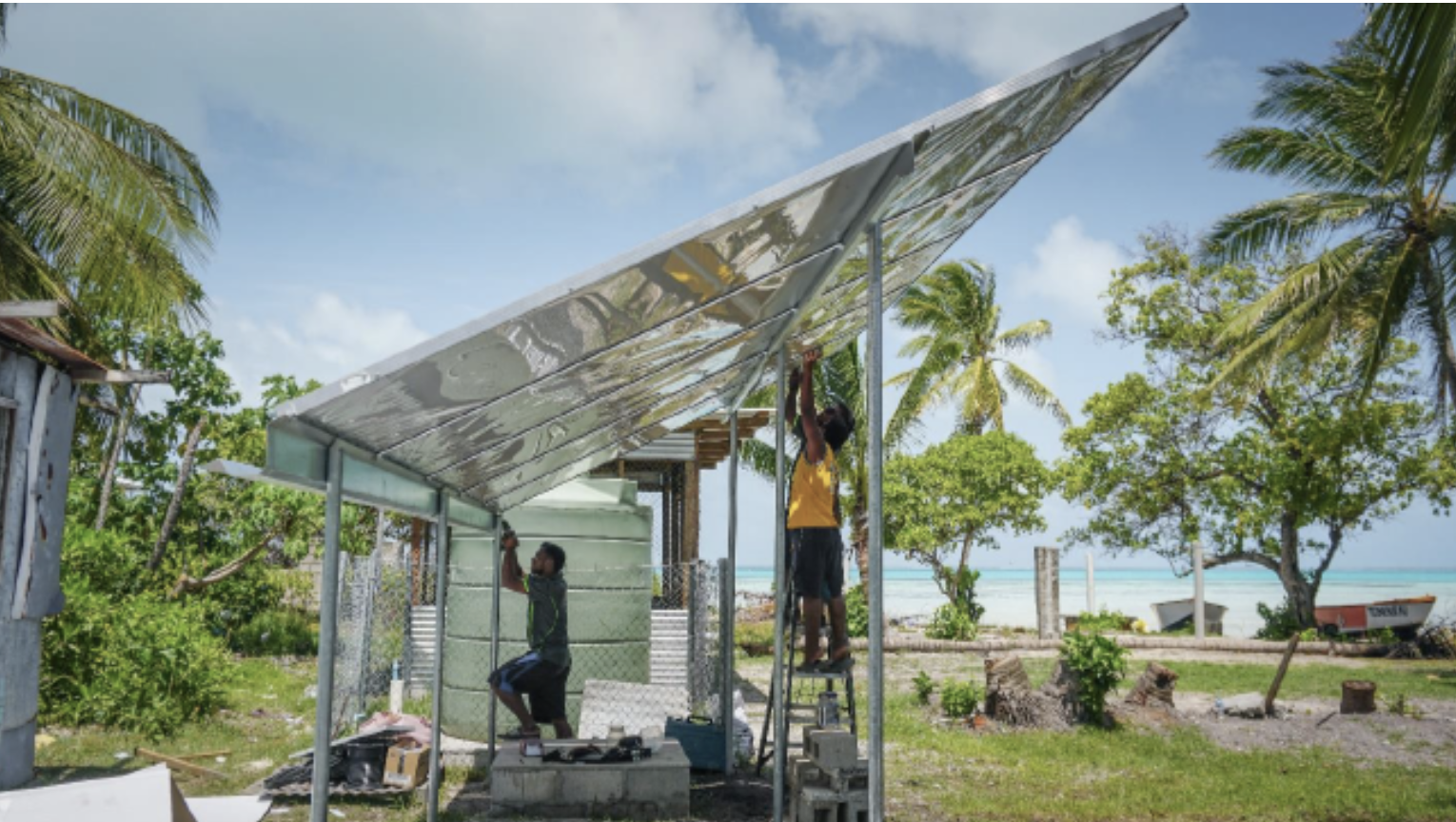Building Climate Resilience in Kiribati: How Solar Innovation is Empowering Indigenous Women
I n the Pacific island nation of Kiribati, climate change has escalated into a severe and urgent crisis. Rising temperatures, prolonged droughts, and declining freshwater sources are placing immense pressure on local communities. With the country heavily dependent on rainfall and groundwater, water insecurity now threatens both the health and livelihoods of the people. As drought conditions worsen, especially since 2022, freshwater supplies have dwindled, leaving thousands without clean water, exacerbating the challenges faced by Kiribati’s indigenous communities, particularly women, who are responsible for sourcing and transporting water.
Local Solutions: Solar Water Farms Led by Communities
Faced with these challenges, the Green Hope Foundation, an international NGO led by young women, is working at the grassroots level to provide a sustainable solution to water scarcity. Through the installation of solar-powered water farms, the foundation is not only addressing water insecurity but also empowering local women and youth to lead the way in climate resilience.
The Solar Water Farm and Distillation System is a modular, all in one solution providing purified, distilled water from any water source including seawater, surface water, groundwater (bores or wells) and rainwater. The source water is fed through a a panel that is directly heated by the sun, distilling the water through the process of evaporation and condensation. The resulting purified water is suitable for drinking, cooking, washing and cleaning. The system is fitted with a rainwater harvesting and filtration component as well.

Solar water farm and distillation system installation in progress
Green Hope Foundation’s project is centered around three key principles of locally led adaptation. First, it addresses structural inequalities by focusing on women and youth, especially from indigenous communities, who are disproportionately impacted by water insecurity. Local women are trained to manage the solar water farms and lead workshops on water conservation and hygiene. This ensures that the community takes ownership of the project while also fostering economic independence for women.
Second, the project builds local capacity through ongoing technical training. So far, ten young women have been trained as water farm ambassadors, responsible for the maintenance of the farms and educating their communities on water, sanitation, and hygiene (WASH).
Third, the project is managed collaboratively with the local tribal councils. The local chapter of the Green Hope Foundation in Kiribati is led by an indigenous woman who works closely with the tribal councils of each village. Together, they manage the funds locally, ensuring that community needs are prioritized and that the entire community is involved in site selection, installation, and long-term management. This collective effort strengthens the project’s sustainability.
Transforming Communities: Health, Empowerment, and Sustainability
The impact of the solar water farms has been transformative. By ensuring a steady supply of clean water, the farms have contributed to a 50% reduction in waterborne diseases in the areas they serve. The versatility of the solar water farms, which can distill water from multiple sources and be expanded with additional solar panels, ensures that communities are no longer solely reliant on erratic rainfall or increasingly salinized groundwater.
Central to Green Hope’s approach is the empowerment of women and youth, who are at the forefront of maintaining and managing the solar water farms. In addition to the technical training, these women lead workshops on water conservation, sanitation, and hygiene, helping to change behaviors and improve health outcomes across their communities.
Scaling Up for Greater Impact
The success of the pilot solar water farm in Taborio village, South Tarawa, which provides clean water to 250 residents, has paved the way for the installation of two more farms on Beru and Tabiteuea islands. These additional installations are now benefiting 1,900 people. Green Hope Foundation aims to further scale the initiative by 2025, with plans to establish solar water farms in five more villages, ultimately providing clean water to 6,500 indigenous people across Kiribati.
These water farms are not only addressing the immediate water needs of the communities but also contributing to long-term climate resilience. By using clean energy, each installation reduces carbon emissions by up to 60,000 kg of CO2 over its lifetime. Moreover, the community-driven approach creates pathways for broader social and economic development, positioning Kiribati’s women and youth as leaders in climate adaptation.
Replicating the Success Globally
The success of Green Hope Foundation’s initiative in Kiribati serves as a model for other climate-vulnerable regions. By 2025, the foundation plans to replicate the solar water farm project in other water-insecure areas, including Liberia and Bangladesh. These regions face similar climate-driven water challenges, and the modular, scalable nature of the solar water farms makes them adaptable to various contexts. Through these efforts, Green Hope is not only addressing the immediate impacts of climate change but also fostering long-term resilience in some of the world’s most vulnerable communities.
The ideas presented in this article aim to inspire adaptation action – they are the views of the author and do not necessarily reflect those of the Global Center on Adaptation.